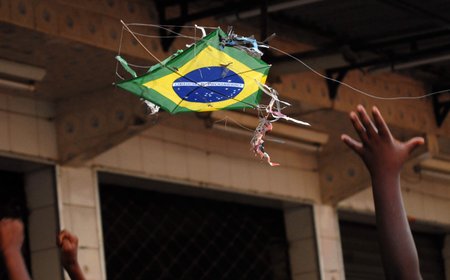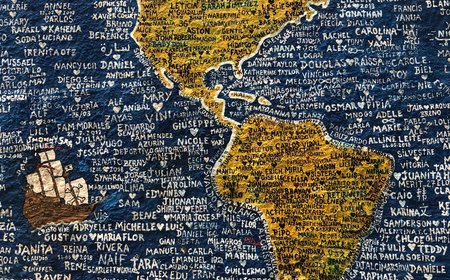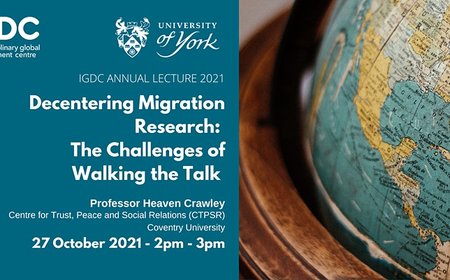Call for submission: Access to rights in South-South migration
Peripheries Journal is a publication of the Eduniperifeiras Publisher, located in the set of Favelas that make up Maré, in Rio de Janeiro, Brazil. Coordinated by our MIDEQ partners in IMJA, Peripheries is dedicated to publishing works authored by subjects of the peripheries and on themes related to global peripheries. Learn more.
Call for submissions
The issue of migration — whether in the context of the movement of people from the Global South to the Global North or between the countries of the Global South – is associated with a series of complex issues: challenges (and opportunities) associated with increasing ethnic, national, religious and linguistic diversity; various forms of intolerance, racism and xenophobia; issues associated with cultural and economic integration of migrants in the destination country; representations about migrants and their countries of origin, among others. Traditionally, the hegemonic perspective on the issues highlighted is based on references produced in dominant countries from the economic and technological points of view — the “North”. This occurs even when we talk about researchers and centers for learning in peripheral countries due to the dominance of “Eurocentric” perspectives in their education process and analytical frameworks. In this way, peripheral countries and their subjects are often considered from a reductionist and stigmatizing perspective, since the “model”, par excellence, of society and country is based on the richest, politically dominant countries. One typical example of this is in relation to the reasons why people choose to migrate and the factors that shape the decision making process in relation to the migrants’ countries of origin and destination. Often they are framed as push factors on the one hand and pull factors on the other. Since the concepts associated with decision making are generally used in an stagnant and dichotomous way, the relational dynamics that characterize migratory movement are rendered invisible. Countries of origin do not solely “push” migrants away. Rather, it is more nuanced. Migrants often insist on maintaining ties and try, to a certain extent, to replicate aspects of life in their origin country to their destination country, in addition to other practices aimed at staying “present in absence”. Additionally, destination countries create constraints and limits for migrants’ proper social integration. Therefore, the reductionist premises that support the notions of “push” and “pull” end up missing the complexity of the relationships between migrants and the territories in which they weave their mobility.
Faced with these examples, and there are many, it is imperative to build new concepts, paradigms, studies and experiences about the migratory phenomenon, in particular within the context of countries of the Global South. Peripheries highlights the importance of considering equality, development and the fundamental access to rights for migrant communities. It also highlights the importance of considering trajectories and perspectives of those who migrate, making the subjects protagonists of this process and paying attention to the subtleties and subjectivities that their experiences foster. As always, complaints are not our focus, although we recognize their relevance in certain aspects. We urge people, collectives and institutions dedicated to working on the issue of migration to contribute to Peripheries 8. We encourage contributions from different expressions of migrant narratives (personal statements, photography, literature and poetry, visual arts and video), in addition to academic research from the Global South (essays and articles). We hope Peripheries 8 will help develop new perspectives for understanding the phenomenon of migration, migrants’ experiences and their ability to create solutions to the problems they face — within the complex political, economic, environmental and social context in which they find themselves.
submissions
Submissions will be accepted at revista@imja.org.br until May 31, 2023. Peripheries accepts submissions in Haitian Creole, English, French, Portuguese, and Spanish in accordance with the details specified below in each editorial category. The Journal accepts submissions that have appeared elsewhere for publication (maximum one other publication platform and with the publication platform’s authorization where it applies).
article: up to 3500 words.
essay: up to 2000 words.
story: story up to 2000 words.
statement: personal statement up to 2500 words.
photographic essay: Collections of photographs on the same theme, containing between 5 and 10 images, with an introductory text. Photographs should be sent in low resolution for consideration. In case of approval, we will send technical specifications for publication.
visual arts: Image production — comics, cartoons, graffiti, painting, engraving, wood engraving, artistic interventions, interventions in space, and all other image-based artistic expressions —, with an introductory text. 5 Images should be sent in low resolution for consideration, with due credit when necessary. In case of approval, we will send technical specifications for publication
editorial line
Peripheries takes the manifestation and appreciation of the Potency of the Peripheries as its guiding editorial line. Collaboration proposals submitted should consider and attend to this principle. For more information see the Letter from Maré and “The Paradigm of Potency and the Pedagogy of Coexistence.” We wish to emphasize that the concept of the Periphery should be considered broadly, extrapolating the urban sphere and contemplating non-hegemonic peripheral realities. As such, we consider the Periphery to include populations and territories composed of the indigenous, quilombolas, religious/ethnic minorities, and Romani peoples, as well as questions of ethnicity and race, gender, LGBTQ+, refugees, and migration.



